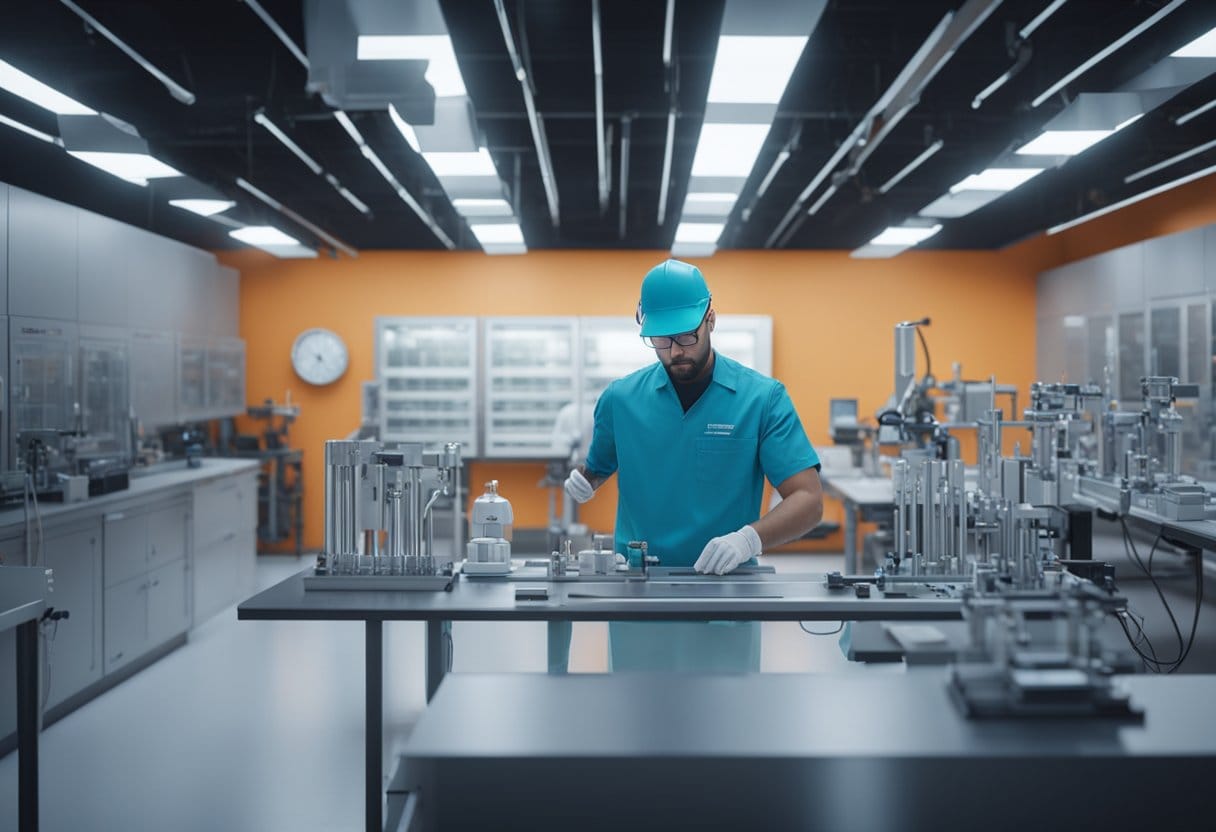Metrology Technician: Essential Skills for Precision Measurement

Metrology technicians play a crucial role in ensuring the accuracy and reliability of measuring instruments across various industries. These skilled professionals work with precision tools and equipment to calibrate, test, and maintain measuring devices.

The job of a metrology technician involves a mix of technical knowledge and attention to detail. They use sophisticated instruments to verify the accuracy of measuring devices and make necessary adjustments.
Their work is essential in maintaining quality control standards and ensuring the smooth operation of manufacturing processes.
Metrology technicians can find employment opportunities in diverse sectors, including aerospace, automotive, electronics, and medical device manufacturing. The average salary for a metrology technician is $62,291 per year, making it an attractive career option for those with a passion for precision and technical aptitude.
Role of a Metrology Technician

Metrology technicians play a key part in ensuring measurement accuracy across industries. They use specialized tools and methods to test, calibrate, and maintain precision instruments.
Definition of Metrology
Metrology is the science of measurement. It deals with the study of units, standards, and methods used to measure physical quantities. Metrology technicians apply this knowledge to ensure accuracy in various fields.
Metrology covers three main areas:
- Scientific metrology
- Industrial metrology
- Legal metrology
These areas span from basic research to practical applications in manufacturing and trade. Metrology technicians often work in industrial settings, but their skills are needed in many sectors.
Responsibilities and Duties
Metrology technicians have diverse duties. Their main tasks include:
- Calibrating measuring instruments
- Testing equipment for accuracy
- Maintaining precision tools
- Analyzing measurement data
- Documenting test results
They work with many types of tools, such as:
- Scales
- Thermometers
- Pressure gauges
- Surveying equipment
Metrology technicians must stay up-to-date with industry standards. They often create test procedures and advise on technical matters.
Importance in Quality Assurance
Metrology technicians are vital for quality control. They ensure products meet exact specifications. This role is crucial in industries like:
- Manufacturing
- Aerospace
- Healthcare
- Electronics
Their work helps companies meet regulatory standards and maintain high-quality output. By catching errors early, they save time and resources.
Metrology technicians also support research and development. Their precise measurements help in creating new products and improving existing ones.
Educational Requirements

Becoming a metrology technician requires specific education and skills. The field demands technical knowledge and practical abilities.
Minimum Qualifications
Most employers look for candidates with an associate's degree in metrology, mechanical engineering, or a related field. This two-year program provides a strong foundation in essential subjects.
Key areas of study include:
- Mathematics
- Physics
- Computer science
Some positions may accept a certificate in metrology. This option can be faster, typically taking less time to complete than an associate's degree.
On-the-job training is often part of the process. New hires may spend 3-9 months learning specific job duties.
Desirable Skills and Knowledge
Employers value additional skills that enhance a metrology technician's effectiveness. These abilities often come from experience or extra coursework.
Desirable skills include:
- Proficiency in calibration techniques
- Familiarity with testing procedures
- Troubleshooting expertise
Knowledge of industry-specific software and measurement tools is a plus. Strong attention to detail and analytical thinking are crucial in this role.
Continuing education is important in metrology. Technology and standards change, so ongoing learning helps technicians stay current.
Metrology Tools and Equipment

Metrology technicians rely on a variety of specialized instruments and tools to perform precise measurements. These tools require careful handling and maintenance to ensure accuracy.
Precision Measurement Instruments
Metrology technicians use a wide range of precision instruments in their work. Common tools include:
- Calipers: For measuring distances between two opposite sides of an object
- Micrometers: Used for extremely precise measurements of thickness and depth
- Coordinate measuring machines (CMMs): For 3D measurement of complex parts
- Optical comparators: To check dimensions against a standard
- Laser scanners: For capturing detailed 3D surface data
Other key instruments are scales, thermometers, barometers, and surveying equipment. Technicians also work with gauges, levels, and plumb bobs for ensuring proper alignment and balance.
Advanced metrology labs may use atomic clocks, interferometers, and mass spectrometers for ultra-precise measurements.
Handling and Maintenance
Proper care of metrology equipment is crucial for accurate results. Technicians must:
- Calibrate instruments regularly against known standards
- Clean tools carefully after each use
- Store equipment in controlled environments to prevent damage
Temperature and humidity can affect measurements, so many tools require climate-controlled storage. Technicians wear gloves when handling sensitive instruments to avoid contamination.
Regular maintenance includes checking for wear, replacing batteries, and updating software. Damaged or out-of-calibration tools must be repaired or replaced promptly.
Metrology technicians need strong attention to detail when maintaining equipment. Even small errors can lead to inaccurate measurements and costly mistakes.
Calibration and Measurement Procedures
Calibration technicians follow strict procedures to ensure accurate measurements. These processes involve standardized practices and detailed documentation to maintain precision and traceability.
Standardization Practices
Calibration technicians use certified reference standards to verify instrument accuracy. They compare equipment readings to known values. This process helps identify and correct any deviations.
Technicians must follow manufacturer guidelines and industry standards. They use specialized tools and equipment for different types of measurements. For example, they might use gauge blocks for dimensional calibration or electronic simulators for electrical testing.
Regular calibration schedules are crucial. Technicians perform checks at set intervals to catch drift or wear. They also conduct calibrations after repairs or environmental changes.
Documentation and Reporting
Detailed records are essential in calibration work. Technicians create calibration certificates for each instrument. These documents include:
- Instrument details (make, model, serial number)
- Calibration date and due date
- Test results and adjustments made
- Reference standards used
- Environmental conditions
They use calibration management software to track equipment history. This helps plan future calibrations and identify trends in instrument performance.
Technicians also write clear, concise reports on their findings. They note any out-of-tolerance conditions and recommend corrective actions. These reports help maintain quality control and comply with regulatory requirements.
Professional Development

Metrology technicians can advance their careers through certifications, licenses, and ongoing education. These opportunities help technicians stay current with industry standards and expand their skills.
Certifications and Licenses
Metrology technicians can earn certifications to prove their expertise and increase job prospects. The American Society for Quality (ASQ) offers a Certified Calibration Technician (CCT) credential. This certification shows a technician's knowledge of calibration systems and processes.
Some states require metrology technicians to obtain licenses. These licenses often involve passing exams on measurement standards and techniques.
Many companies value certifications from equipment manufacturers. These show proficiency with specific tools and instruments used in the field.
Continuing Education
Professional development opportunities are important for metrology technicians to keep up with changing technology. Many attend workshops and seminars on new measurement techniques and equipment.
Online courses offer flexible learning options. Topics may include advanced statistics, uncertainty analysis, or specific metrology applications.
Some technicians pursue associate's or bachelor's degrees in metrology or related fields. These programs provide a deeper understanding of measurement science and can lead to higher-level positions.
Professional organizations like NCSL International offer resources and events for ongoing learning. These help technicians network and stay informed about industry trends.
Workplace Environment

Metrology technicians work in controlled settings that prioritize precision and safety. Their workspace requires specialized equipment and adherence to strict protocols.
Safety Protocols
Metrology technicians often wear safety gear like gloves, safety glasses, and lab coats. This protective equipment is crucial in laboratory and production environments.
Technicians must follow strict safety guidelines when handling sensitive measuring instruments. They need to be aware of potential hazards like electrical risks or chemical exposure.
Regular safety training is typically required. This ensures technicians stay up-to-date on best practices and new safety standards.
Teamwork and Communication
Metrology technicians often work as part of a larger quality control team. They may report to a Quality Control Manager or Metrology Supervisor.
Clear communication is vital in this role. Technicians must accurately document their work, including test results and detailed reports.
They often collaborate with engineers, manufacturers, and other departments. This teamwork helps ensure products meet quality standards.
Technicians may need to explain complex technical information to non-technical staff. Strong verbal and written communication skills are essential for success in this field.
Career Advancement Opportunities
Metrology technicians have several paths for career growth. As they gain experience, they can move into senior technician roles with more responsibilities.
Some technicians become supervisors or managers overseeing calibration and testing departments. This allows them to lead teams and manage projects.
Further education can open more doors. Getting a bachelor's degree in engineering or a related field may lead to higher-level positions.
Specializing in a particular area of metrology can also boost career prospects. For example, focusing on dimensional metrology or electrical calibration can make a technician more valuable.
Some metrology technicians move into quality assurance roles. Their expertise in measurement and precision is useful for ensuring product quality.
Others may become trainers or instructors, teaching new technicians the skills of the trade. This can be a rewarding way to share knowledge and experience.
Staying up-to-date with new technologies and methods is crucial for advancement. Attending workshops, getting certifications, and learning about new equipment can help technicians progress in their careers.
Industry Standards and Compliance

Metrology technicians must follow strict rules and get approval from important groups. This keeps their work accurate and trusted.
International and National Regulations
Metrology technicians need to know many rules. The International Organization for Standardization (ISO) sets global standards. These cover how to measure things and keep records.
Countries have their own rules too. In the U.S., the National Institute of Standards and Technology (NIST) makes guidelines. Technicians must follow these when they test tools and machines.
Some industries have extra rules. For example, car makers have strict standards for parts. Medical device companies must meet FDA requirements.
Accreditation Bodies
Accreditation bodies check if labs and technicians meet standards. The International Laboratory Accreditation Cooperation (ILAC) is a key group. They make sure labs in different countries work the same way.
In the U.S., the American Association for Laboratory Accreditation (A2LA) is important. They check labs and give out certificates. Technicians often need to show they've trained with these groups.
Companies like to hire technicians with accreditation. It proves they know the latest methods and rules. Some jobs require specific certificates from these bodies.
Emerging Trends in Metrology
Metrology is evolving rapidly with new technologies and approaches. These advancements are changing how measurements are taken and analyzed across industries.
Technological Innovations
Automation and data analytics are reshaping metrology. Automated systems now handle complex measurements, cutting down on human error. This boosts speed and precision in quality control.
Advanced software helps make sense of measurement data. It spots patterns and issues that humans might miss. This leads to better products and processes.
Multi-sensor devices are becoming more common. These tools combine different measurement methods in one machine. They can use touch probes, cameras, and even X-rays to check parts.
3D scanning is getting faster and more exact. It's useful for checking complex shapes quickly.
Future Prospects in Metrology
The metrology market is growing fast. Experts think it will reach $377.30 billion by 2029.
This growth shows how important precise measurement is becoming.
Augmented reality is starting to be used in metrology. It can help technicians see measurement data in real-time while looking at a part.
AI and machine learning will play bigger roles. They can predict when machines need calibration and spot defects early.
Quantum sensors may offer new levels of precision. These could measure things we can't measure well today.

